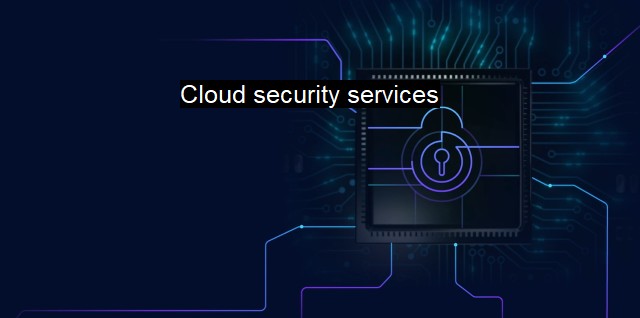What are Cloud security services?
Securing the Cloud: Exploring the Benefits and Risks of Cloud Security Services for Enterprises
Cloud security services are an essential aspect of today's cybersecurity landscape, offering significant protections and countermeasures in the world of computing and digital information storage. Given the rise and preponderance of cloud computing currently deployed by companies and individuals alike, securing these digital spaces is of utmost importance.The terminology "Cloud security services" paints an intricate picture that includes a wide range of strategies, technologies, tools, and practices designed to enhance the protection of data, applications, and core infrastructures involved in cloud computing. Drawing its weight from logical, physical, and process security, Cloud security services encompass layers of defense measures that include access control, authentication, encryption, and security audits.
Consistent with conventional cybersecurity standards, cloud security services operate with a fundamental principle—that of safeguarding information by preventing unauthorized access, mitigating damage from potential attacks, shielding critical infrastructures, and ensuring privacy. given the ephemeral nature of the cloud environment where data is dispersed across multiple servers and locations, securing the cloud requires specialized techniques and a refined approach.
One of the key components in cloud security services is identity and access management (IAM). This involves setting up strict controls and permissions to authenticate user identity and regulate access to information. By assigning and managing user roles, IAM not only ensures that only authorized and authenticated users gain access to specific resources but also provides a way to track user activities, thereby contributing to the easier detection of abnormal patterns indicative of a security breach.
Encryption is another technique pivotal to cloud security services. Encrypting data masks the content and makes it unreadable, intercepting unauthorized access and ensuring complete confidentiality during transit or even at rest within the cloud. This, combined with secure key management practices, adds an extra layer of protection for sensitive data.
Cloud security services must also feature a robust antivirus component. Given the unprecedented growth in the number and sophistication of cyber threats, an effective antivirus solution that can scan, allow threat intelligence, identify, and eliminate malware quickly is a necessity. Such antivirus services leverage leading-edge technologies such as machine learning and pattern recognition to prevent infiltration from ransomware, worms, Trojans, and other malicious programs.
Two primary models of cloud security services can be observed today - Security-as-a-Service (SECaaS) in public cloud services, and private cloud-based security. SECaaS incorporates security applications as a subscription service, typically involving intrusion detection, encryption, and antivirus protection. In contrast, private cloud security revolves around in-house controlled and managed security services offering more customization and control.
Continuous monitoring capabilities are another valuable asset to cloud security services. Because cloud environments are always evolving and continuously operational, it is crucial to have uninterrupted visibility of all activities across different cloud-hosted applications and servers. Behaviour analytics, log inspection, and frequent security audits are techniques used to achieve this.
Lastly, Cloud security services need to address compliance regulations. Different sectors require data protection and privacy compliance guided by regulatory frameworks given by GDPR, HIPAA, or ISO among others. These security services should ensure that cloud platforms are compliant and work towards minimizing risk and potential breaches.
Cloud security services represent a dynamic grouping of cybersecurity measures tailored specifically for safeguarding data and applications in the nebulous scape of cloud computing. Given the escalating importance of digitized data and growing reliance on cloud technology, the necessity for strong, effective cloud security cannot be overstressed in our evolving technical environment. Achieving top-notch cloud security requires the proficient blend of governance, technology, users, and processes to shield our digital world from constantly looming cyber threats and cybercriminals.

Cloud security services FAQs
What is cloud security?
Cloud security refers to the set of policies, technologies, and controls used to secure data, applications, and infrastructure in the cloud. It involves protecting cloud-based assets from cyber threats, unauthorized access, and data breaches.What are cloud security services?
Cloud security services are a range of cybersecurity solutions designed to protect cloud-based resources from cyber threats. These services include cloud security assessments, identity and access management, network security, data encryption, threat detection and prevention, and security incident management.Why is cloud security important?
Cloud security is important because it helps to ensure that sensitive data and applications hosted in the cloud are protected from cyber threats. Without proper security measures, cloud-based resources can be vulnerable to data breaches, cyber attacks, and other types of security incidents. Cloud security services can help organizations to maintain compliance with industry regulations and avoid costly data breaches.How can I choose the right cloud security services for my organization?
Choosing the right cloud security services for your organization involves assessing your security needs, identifying potential risks and vulnerabilities, and evaluating different service providers. Look for providers that have experience working with organizations in your industry and that offer comprehensive security solutions tailored to your specific needs. It's important to choose a provider that offers proactive threat monitoring and incident response services to help you quickly detect and respond to security incidents.| | A | | | B | | | C | | | D | | | E | | | F | | | G | | | H | | | I | | | J | | | K | | | L | | | M | |
| | N | | | O | | | P | | | Q | | | R | | | S | | | T | | | U | | | V | | | W | | | X | | | Y | | | Z | |
| | 1 | | | 2 | | | 3 | | | 4 | | | 7 | | | 8 | | |||||||